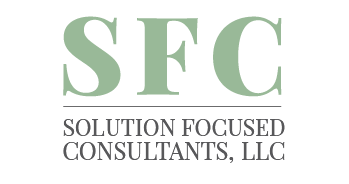Focused on Solutions, Not Problems
Focused on Solutions, Not Problems
Who We Are
Solution Focused Consultants offers an uncommon, solution focused approach to personal coaching, business consulting, executive coaching, and organizational development. All services are specifically tailored to meet your needs.
Our Approach
Since our first consulting engagement more than thirty years ago, we have worked on developing an active, practical, creative, and solution focused approach to resolving an organization’s concerns in an expedient fashion. This approach has demonstrated itself to be effective in developing and implementing solutions across a wide variety of organizations. We are able to meet with clients on-site at their place of business, over the telephone, or by virtual meetings through FaceTime, Zoom, Microsoft Teams, and Google Meet. In the past few years we have worked with clients in 28 states in the US and Virgin Islands.
Types of Companies and Industries We’ve Worked With:
Our Services
Available services include, but are not limited to:
What Sets Us Apart
This style of business consulting can be differentiated from other approaches in two primary ways.
Pragmatic Effectiveness
- The consultation is viewed as a brief process, aimed at initiating and maintaining significant individual and organizational changes.
- Every consultation plan is individually developed and structured to address that specific organization’s needs and concerns, thus never rigid or “cookie cutter” in its approach.
- Formal standardized testing and assessment measures are rarely utilized, never on a routine basis, and only when necessary and specifically indicated. This saves the organization unnecessary cost.
- The entire approach is solution focused, which allows for more quickly delivered results, rather than a much longer, and typically more unclear process-oriented approach.
Cost Effectiveness
- There is no minimum engagement fee for the consulting services.
- All services are billed on an hourly basis for the actual time spent.
- There are no charges for brief phone consults, and both travel and preparation time are capped.
- Our hourly rate of $180.00 for Personal Coaching, Executive Coaching, and Business Consulting services, is less than one half of the standard billable rate of many larger consulting firms.
- The solution focused approach means faster results at a lower total cost to the organization.
- This brief, individualized approach, means less waste of valuable staff time during the consulting process.
What Is A Solution Focused (SF) Approach?
The SF approach is a briefer and more cost effective approach, compared to more traditional, process-oriented consulting and coaching. The pragmatism, flexibility, and results of SF have been demonstrated around the world. Another hallmark of the SF approach, is that practitioners have worked to keep the approach open source, rather than restricting or licensing the intellectual property. The international SF community strives for, and values, openness, generosity, and appreciation.
Executive Coaching
In the area of Executive Coaching, many SF practitioners utilize the OSKAR model.
utcome – what outcome is wanted for the client, for the topic, and for the session?
cale – on a scale from 1 to 10, where 10 is the desired outcome, where are you now?
now-how – what is getting you that high on the 0 to 10 scale already? What other relevant know-how can be found in your organization?
ffirm & action – what are you doing right? What are some small next steps?
eview – what is better since the last coaching session? How did you do that?
Business Consulting
In the area of Business Consulting, there are two guiding models of the SF method:
The first, from Jackson and McKergow in a 2002 paper, is known as the six SIMPLE principles.
olutions – not problems
n between – not individual effort
ake use of what is there – not what isn’t
latform – what is the issue?
anguage – simply said
very case is different – beware ill-fitting theory
These same ideas are expressed in another SF model from Hjerth (in Klingenstierna, 2001). This is known as the PLUS model.
ossibilities – from the past, present and future
ook from the preferred future – what is wanted
utilize successes and resources – use what is already working
tepping the scales – what are next steps forward
Our Team
-
Mark A. Cook, Ph.D.
Mark Cook graduated Phi Beta Kappa from Indiana University, with his Bachelor’s Degree. He also earned both a Master’s and a Doctorate degree from Washington University in St. Louis.
-
Jay Fedora, MBA
Jay Fedora obtained his Bachelor’s degree from MIT and holds an MBA from Washington University in St. Louis. Jay has over 25 years of consulting experience specializing in strategic planning, process improvement and organization change management.
-
Michael L. Lyons, J.D.
Mike Lyons is an experienced attorney who has litigated in both state and federal court, including practice before the Supreme Court. Over the past 25 years he has specialized in alternative dispute resolution (ADR).













